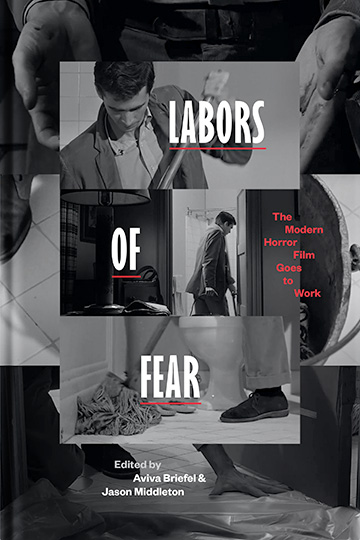
- Publisher: University of Texas Press
- Available in: Print, Epub
- ISBN: 9781477327210
- Published: June 20, 2023
Edited by Aviva Briefel and Jason Middleton
How work and capitalism inspire horror in modern film.
American ideals position work as a source of pride, opportunity, and meaning. Yet the ravages of labor are constant grist for horror films. Going back decades to the mad scientists of classic cinema, the menial motel job that prepares Norman Bates for his crimes in Psycho, and the unemployed slaughterhouse workers of The Texas Chain Saw Massacre, horror movies have made the case that work is not so much a point of pride as a source of monstrosity.
Editors Aviva Briefel and Jason Middleton assemble the first study of horror’s critique of labor. In the 1970s and 1980s, films such as The Shining and Dawn of the Dead responded to deindustrialization, automation, globalization, and rising numbers of women in the workforce. Labors of Fear explores these critical issues and extends them in discussions of recent works such as The Autopsy of Jane Doe, Midsommar, Survival of the Dead, It Follows, Get Out, and Us. Covering films ranging from the 1970s onward, these essays address novel and newly recognized modes and conditions of labor: reproductive labor, emotion work and emotional labor, social media and self-branding, intellectual labor, service work, precarity, and underemployment. In its singular way, horror continues to make spine-tingling sense of what is most destructive in the wider sociopolitical context of US capitalism.
Reviews
A groundbreaking collection, framed thoughtfully by the editors, with consistently excellent chapters that tackle the underexamined central question of “work” in creative, provocative, and original ways.
-Dawn Keetley, author of Making a Monster: Jesse Pomeroy, the Boy Murderer of 1870s Boston
Employing an expansive understanding of work, Labors of Fear is a valuable intervention that centers economic and labor issues. I know of no other book that examines how work or capitalism and fear are intertwined in the horror film.
-Isabel C. Pinedo, author of Difficult Women on Television Drama: The Gender Politics of Complex Women in Serial Narratives
An intriguing array of essays that consider horror and various forms of labor and work. . . By analyzing and reflecting on these films—and how labor and work in all their forms relate to the terror of the contemporary—this collection illuminates the fears and frights to be found not only in the cinema but also in one’s own occupations.
-CHOICE